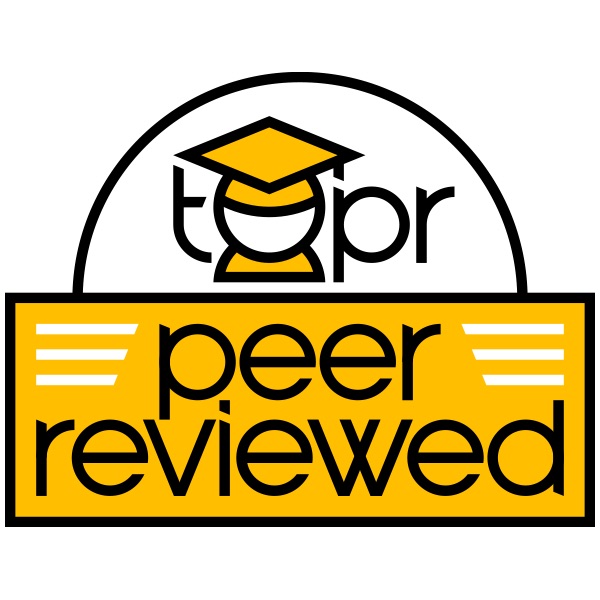
“In the United States, almost 50% of the students who follow a degree in science, technology, engineering, or mathematics (STEM) will not complete it” (Johnsom et al., 2022).
Moreover, when the World Health Organization announced about the onset of the COVID-19 pandemic, Kindergarten to 12th grade schools and institutions of higher learning worldwide responded with suspension of face-to-face instruction (Code et al., 2022). Accordingly, the setback is expected to be greater if we don’t collectively implement effective teaching strategies and provide guidance to the students on navigating through the new challenges.
In this article, we are concerned with the failure rate in the course entitled “Precalculus Algebra” since it is a prerequisite course for Calculus I. It is critical for students to make plans that are adaptable to new situations to improve their learning and experiences after the pandemic. Those plans need careful and timely guidance and support from instructors, supervisors, and the support staff. To design an appropriate strategy, we investigated how we conducted the course prior to the pandemic and the emergency shift to online instruction during the pandemic. Emergency remote teaching varied significantly from an intentionally designed course for online modality (Fuchs, 2022). We set up a redesign that incorporated best practices available to us. For instance, a “Success Module” became a necessary strategy to face post-pandemic challenges.
Link to example artifact(s)
We realize that many issues were observed after the pandemic such as the learning loss of students and economic difficulties that resulted due to inflation and increased cost of housing due to the unexpected spike in rental costs. Although many of the students needed help to bridge gaps in prerequisite knowledge, they could not afford to stay closer to the campus. Hence, we kept offering both live Zoom and recorded lectures in addition to in person instruction in our classrooms. We modified the computer lab requirement from a “must attend on Fridays” to a “proactive option”. If a student earned a certain mastery on a homework and a pre-lab (both online) by Thursday, the student could choose not to attend the lab on Friday.
Consequently, students who lived far from the campus could access lectures and labs online if they worked proactively on the assignments and demonstrated the desired mastery. They were required to be on campus to appear at proctored examinations. A “Success Module” in Canvas was set up to provide students with guidance on various aspects of the course design.
Below are some of the ideas included in the Success Module which worked for us:
Attendance and Participation
Making recommendations to students based on research findings so they know well how to use attendance and participation options. They were advised to plan their attendance and participation in class activities and shouldn’t adhere solely to convenience. Based on EDUCAUSE REVIEW editor’s pick (Crisp, 2021), video can be effective in replacing a teacher to a lesser degree, and when comparing the usefulness of video for obtaining skills against knowledge, the video is ideal for teaching skills and has a lesser impact on knowledge acquisition. Hence,
A student is recommended to attend classes in person and take notes if the student has easy access to campus. Else, the students can attend live Zoom lectures and take notes.
If the live lecture is missed the student should watch the video on the same day as the lecture, and not on a later day. Recordings can also be watched after attending live lectures to fix their own notes or to reinforce parts of the lectures where difficulty is encountered.
One of the best investments that a student can make is to write his/her own notes in a neat manner. It is recommended to create a summary after each section or chapter to sum up what they learned in that section or in that chapter.
Doing the Homework
Many students see the homework due date as an indicator to start the homework right before it’s due, which isn’t helpful to their learning. The guidance is to give space between the start of the homework and the date of completion. For example, if homework is due on Sunday, the student should start it when it’s available, complete 50% of it by the second lecture (Wednesday/Thursday), and complete 100% by Friday. The remaining period should be used for a cumulative review or to work ahead and have a good idea on upcoming topics.
Social Aspect
Students are encouraged to communicate and feel secure about sharing common interests and challenges. They should do their best to make connections with their instructors during class and during office hours, to engage with classmates in person or online, and to interact with learning assistants during review and tutoring sessions. Learning assistants referred to here are undergraduate students who took the course before and did well in it. Their main job is to support students’ learning and provide timely assistance to their understanding.
Correcting Prior Knowledge and Improving Current Concepts
The first step is to take a diagnostic assessment and learn about the gaps in one’s knowledge.
The second step is to work on necessary remediation and practice problems of the same kind included in the class assignments. Discuss GeoGebra concept questions with others and write reflections after each assignment.
Use of available resources: Students are provided information of free tutoring on campus like “Ask a Librarian”, “the University Writing Center”, “UCF CARES”, “Student Accessibility Services”, “Academic Advising”, “Adaptive and Inclusive Recreation”, “All- Knight Study”, etc.
We present below what we learned through our experience:
Artifact One: Snapshot of the Success Module
This artifact shows a snapshot of Success Module from a precalculus course. It can be implemented in any course and the instructor can decide which items are necessary and useful for a student to follow. For example, ‘Read How to Succeed in This Course’ is a document that includes some of the strategies mentioned above. ‘Common Math Errors’ is an awareness tool of mistakes that students often commit. The purpose is to discuss why they occur and how to reduce them. ‘Take Diagnostic Test’ is an initial knowledge check tool that helps both the student and the instructor know about student’s prior knowledge and estimate the gap of topics in their knowledge to predict needed effort to do well in the course.
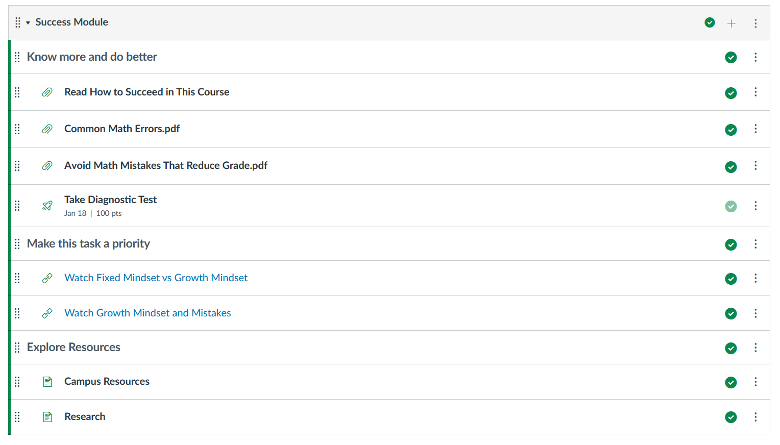
Artifact Two: Awareness of Mindset Types
Students are encouraged to watch the two videos and adjust the way they perceive their abilities in doing math. Having a growth mindset means to simply believe that one’s abilities can be developed through dedication and effort. We realize that abilities aren’t inherently inflexible. Notes from the two videos are also integrated in lessons for reinforcement. Videos are provided by textbook publishing company, Pearson. The snapshots are posted below, and these are the links: Do you have a Growth Mindset? video and The Power of Making Mistakes video.
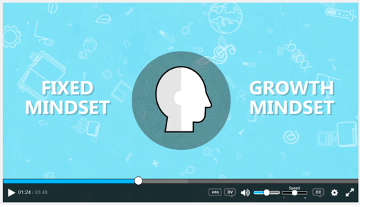
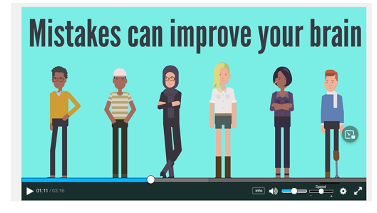
The purpose of the second video is to see that making mistakes is a natural part of the learning process. When mistakes occur, we use them to learn, and when we track their frequency or classify them (conceptual, computational, lack of attention, etc.), we are simply trying to lower that frequency. Types of mistakes in math:
- Lack of attention and copying a question or a step incorrectly.
- Concept error is due to not having necessary knowledge to answer or perform a step.
- Computation error is due to misusing a calculator or rounding in intermediate steps.
Artifact Three:
Incorporate GeoGebra questions that challenge concept learning. Usual questions in the homework contain questions that are directly related to the textbook. Those GeoGebra questions reverse the thinking. For the example below, instead of giving a polynomial and asking about its end behavior, roots, and the y-intercept; the question is asking for the function. Different students can enter different values, yet if the form is correct, it’ll give credit. Hence, many possible solutions exist.
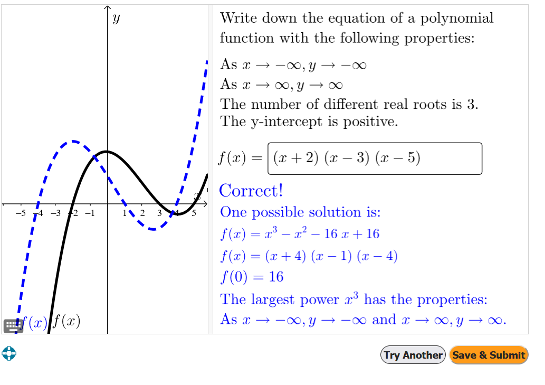
Impact
Success Module can be implemented in any course. It is a transparent way of helping students recognize how to be successful in the course. The instructor collects ideas and strategies that help students to be successful in a course and uses different formats to communicate those ideas such as step by step guide, weekly action plan, videos, etc. As far as this implementation is concerned, students showed good engagement in different parts of the course. They also came to office hours at a higher rate than the previous years. If they didn’t perform well on a test, they wanted to know how to adjust their plans based on given strategies.
Surveys showed positive responses to perceptions on improving study skills and critical thinking. For GeoGebra questions, 79.16% of the students who responded to a survey said that the concept questions challenged their understanding and learning. In spring 2023, the average success rate in two large precalculus algebra sections with total of 728 students was 84.5%. We feel very confident that we have a well-designed path to address student study skills and to post-pandemic challenges.
Link to scholarly reference(s)
Code, J., Ralph, R., & Forde, K. (2022). A Disorienting Dilemma: Teaching and Learning in Technology Education During a Time of Crisis. Canadian Journal of Science, Mathematics and Technology Education, 22(1), 170–189.
Crisp, E. (2021). Authentic and Effective : Rescuing Video from Its Role as the Villain of Online Learning. EDUCAUSE REVIEW.
Fuchs, K. (2022). The Difference Between Emergency Remote Teaching and e-Learning. Frontiers in Education, 7, 1–22.
Johnsom, E., Apkaria, N., Vroom, K., Martinez, A., Rasmussen, C., & Bressoud, D. (2022). Addressing challenges to the Precalculus to Calculus II Sequence through Case Studies: Report based on the National Science Foundation funded project progress through calculus. The Mathematical Association of America.
Citation
Ait Maalem Lahcen, R., & Mohapatra, R. (2023). Incorporating a Success Module in Precalculus Algebra to Face Post-Pandemic Challenges. In deNoyelles, A., Bauer, S., & Wyatt, S. (Eds.), Teaching Online Pedagogical Repository. Orlando, FL: University of Central Florida Center for Distributed Learning.